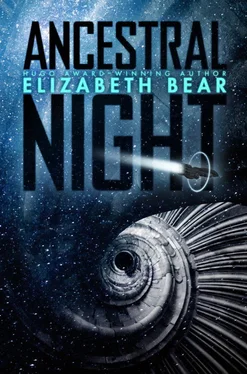Please come back, Singer.
He would if he could. And so would Connla. I didn’t have any doubt about that now. And I wasn’t alone out here. I had a giant bug to help me. (In all honesty I was probably the sidekick in this equation. But it makes me feel better to pretend otherwise.)
It was a long way down to the bottom of the well. That just meant it would take me a long time to fall.
I could do this thing.
If Farweather could do this thing, so could I.
♦ ♦ ♦
Farweather was a long shot better at it than I was, however. Faster. More confident.
I got to my first disk and balanced on it while I surveyed the situation. At least it didn’t try to buck me off.
Farweather was the one who made an extreme sport of plunging through space under her own impulse, sliding about shipless in the void—and practice counts. I wished I believed in the convenient entertainment myth that just really wanting it more than the other guy was enough to insure success.
That and being pure of heart, of course.
Did I want to capture Farweather more than Farweather wanted to avoid being captured? Somehow I doubted it. Couldn’t stop me from trying, though. And I definitely had the pure-of-heart aspect squared away.
I calculated her likely next few jumps, because calculated is a much nicer term than scientific wild-ass guessed . Then I gritted my teeth and told myself, “Might as well die doing something as nothing.” Another saying I’d learned from a crusty old engineer—this one a Tralikhan master chief I’d worked under for six decians on a passenger liner early in my checkered career. That was one of the ways I’d learned I hated working on passenger liners, though engineering was better than the purser’s job.
I shifted my weight from side to side, rocking the mirror disk I crouched on, trying to get a feel for its variable motions as it flocked with the others. I was on one of the smallest ones, maybe two meters across. The next disk was larger, and the distance to it was not insurmountable by any means, just terrifying. And variable, as they moved in relationship to each other. I tried to remind myself that if I missed, I would not go sailing helplessly into the outer darkness. The atavistic part of my brain did not believe me. I tuned it down, but I was pretty sure my fox still wasn’t working right, because while the panic was dulled, it was still there.
Fun.
At the moment, my current ride was closing on my next objective. I stared hard, as if that could make my leap more accurate, and reminded myself that the disk I was on would move away from me with reactive force when I pushed against it.
I patted my faithful steed fondly with a suit glove before I abandoned it.
I staggered when I landed, and my afthand gripped the edge of the disk hard to steady me. The pain was sudden, immediate, and sharp. My suit squeezed my afthand as it sealed, keeping pressure on the wound and keeping my air in.
The disk was sharp as a laser. I felt lucky I’d kept my aftfingers, as I tuned out the pain and told myself it wasn’t too bad. Probably. I could always grow new fingers, if they died of gangrene.
A strange sound echoed in my inner ear, through the Koregoi senso. Like the alien music that had permeated the Prize. A sorrowful run of notes that put me in mind of an apology.
But the jump had been easy.
Almost too easy, as if a guiding hand were planted in the seat of my pants. I didn’t think the Jothari or Freeporters were likely to be helpful. Singer was out of the system and still heading away at superluminal velocities. Farweather was running away.
That left one obvious candidate.
“Baomind?” I said.
I don’t know why I expected it to recognize the name Singer and I had just given it. I don’t know why I wasn’t more surprised when it did. Maybe the religious types are right and setting your intention matters.
It felt—it felt like the Ativahikas had, when they spoke to me. As if something were inside me, vast and ancient and yet also somehow still a part of me, or containing me, speaking from the halls of my own being. Speaking in a language deeper than any I had ever had to learn.
A language I had always known.
The thing that welled up inside me wasn’t words, exactly. It was… notes, music. A pattern of sounds, or perhaps it would be more accurate to liken it to the recalled memory of sounds, arranged into a pleasing and harmonious whole. As Singer had described it—a song.
I was not in any respect a musician. But I accepted the sound as an attempt to communicate, and attempted to sort out the sense of it. Unfortunately, I just did not have the skill to unpack it, and Singer wasn’t there to help.
It was glorious . But it had layers and depths and was basically a textured wall of sound, like listening to an entire party of people talking all at once. It was beyond me to interpret.
Well, all right then.
Unable to hear words, I listened for tone. You can tell if a song is sad or happy even if you don’t know the language it’s being sung in, generally. Of course it was the basest ethnocentrism to assume that my human experience of emotion and music were anything like a syster’s experience of same. And this wasn’t even a syster. This was a sentient artifact left behind by a long-lost alien civilization. Or civilizations: we still didn’t have a very good idea of what—who—the Koregoi had been. Their artifacts were scattered around, but more than that—they had left hints for us, bits of knowledge, the remains of a strange sort of library, perhaps. Woven into the very fabric of the dark gravity that held the universe together.
Literally.
I was starting to realize that we, all of us—Synarche, pirates, Jothari, even the Ativahikas—were living in the ruins of the Koregoi’s enormous and shadowy house.
Hell, they might still be out there somewhere. They might just be living in white space, or some similar gap between the fibers of the conventional universe. They might have translated themselves to a state where they could interact with whatever caused the dark gravity directly. They might have advanced to the point where they were carrying on a limitless multidimensional existence where distances had as little meaning for them across galaxies as they did for us on a planetary scale.
I should have asked Singer how the Baomind sang, I realized now, in the soundless depths of space. Now I knew; it sang inside its own mind.
Well, at least it sounded friendly. And Farweather was getting farther away as I dithered. Cheeirilaq, too, who was racing along the disks, leaping from one to another with astounding insectile bounds, leaving a shimmering trail of web behind it as a safety line.
I wondered about the design of the valve on its suit that let its webbing out. Even while chasing Farweather.
You don’t just stop being an engineer.
♦ ♦ ♦
I needed to get my head in the game, and so I tuned and bumped with abandon. I didn’t go sociopath: I didn’t trust my wonky fox to put me back again. But I went far past anywhere I normally would have, and sent myself into a state of confidence and hyperfocus called hypomania.
It was bliss. Calm happiness and confidence centered me, along with a cheerful determination to get the job done. I wasn’t tired anymore. I wasn’t sore. I wasn’t limping on a damaged limb. I knew, somewhere distantly, that I ought to be scared, but I wasn’t scared. I was warmly confident that I could get every bit of this done.
If I could have, I would have stayed in this state forever. If for nothing else, for the amazing sense of calm and confidence that suffused me, the feeling that I was competent and wise enough to do whatever it took to get what I needed.
Читать дальше












